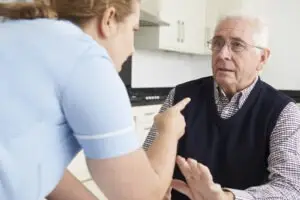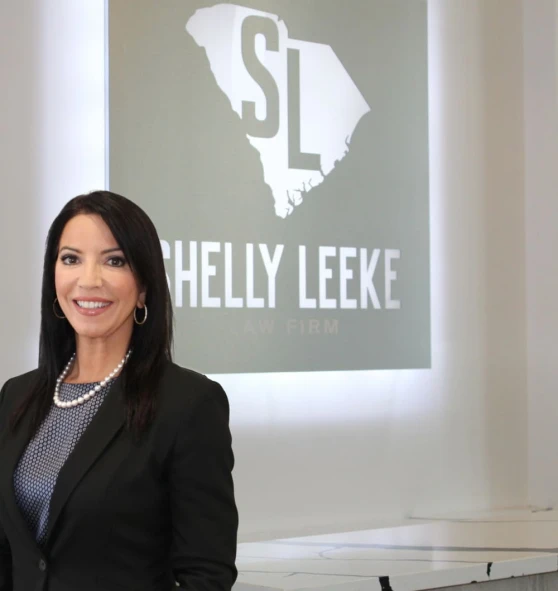
Moving your loved one into a nursing home can be bittersweet, even when done to provide them care and stability. The transition of placing them into an unfamiliar place may initially feel overwhelming, but peace of mind usually returns when they are cared for properly. However, not all nursing homes uphold the standard of care advertised, and abuse or neglect may occur.
If you think you are seeing signs of abuse in your loved one, Shelly Leeke Law Firm can help you pursue justice and take legal action to the fullest extent. We have helped families like yours recover millions of dollars for their damages. Your dedicated Charleston personal injury lawyer is here to help you with investigative measures, managing medical records, and, if needed, litigating your case in court during a trial.
Discover if your case qualifies and how to go about collecting compensation by contacting a respected Charleston nursing home abuse lawyer for help today.
How Often Elderly Victims Experience Nursing Home Abuse
Social isolation, financial hardship, and staffing shortages since the COVID-19 pandemic have impacted the rate of nursing home abuse at an exponential rate. According to the National Institutes of Health (NIH), one in five elderly victims experienced abuse during the pandemic, a steep increase of 86.3 percent since before the pandemic. It is estimated that five million elderly people experience sexual, physical, mental, emotional, and psychosocial abuse annually.

Signs of Elderly Abuse in Nursing Homes
According to South Carolina law under South Carolina Code §16-3, elder abuse includes exploitation, neglect, and physical or psychological abuse. If you are unsure that your loved one is being abused in a nursing home, there are several visible signs and behaviors you may watch out for. Some examples of potential warning signs could include:
- Changes in personality and social withdrawal
- Regressive, childlike behavior
- Avoiding contact with the body
- Fear of the staff
- Clothes and linens that are soiled or stained with bodily fluid
- Numerous scrapes, bruises, and shattered bones
- Marks indicating restraint on the wrists and ankles
- Variations in visitation and staff monitoring at all times
You should always approach filing a complaint with caution. In some instances, it can be rectified through corrective action by the facility. However, seeking legal counsel is the best approach if the administration is attempting to cover it up or not taking your concern to heart.

Elderly Abuse Found in Nursing Home Settings
Elderly abuse will not always look the same in each case. The fact that abuse and neglect can take several forms is partly how abuse continues to go unreported, sometimes for years, if ever. Your nursing home abuse lawyer in Charleston has managed various cases in which abuse was demonstrated through the following categories:
Physical Abuse
Broken bones, bruises, burns, dislocated joints, hospital stays, and sudden hair loss are all common injuries that staff members or other nursing home residents may cause. It is one of the most noticeable signs of abuse. If you notice unexplained injuries, it may be time to step in on your loved one’s behalf.
Emotional Abuse
Psychological abuse can take many different forms. Bullying, intimidation, seclusion, mockery, threats, and ranting are just a few. Because they are concerned about being punished for speaking up, many elderly persons who experience this form of abuse do not disclose it.
Neglect
Understaffing, underpaying, or underqualified staff can result in a facility failing to prioritize its patient residents’ needs. The resident may be living in unclean conditions or needing only the most basic care, such as diet or therapy. It may also result from a failure to address medical requirements such as help with movement and medicines.
Sexual Abuse
This includes rape, coerced nudity, taking explicit photos or videos, and unwanted contact. Any type of unwanted interaction with a resident or staff member is unacceptable. You may notice social isolation and personality changes as a result of sexual abuse.
Financial Abuse
Financial abuse includes unexplained transfers of money, frequent pointless withdrawals from accounts, missing property, falsified financial documentation, and healthcare fraud such as phantom billing and up-coding billing. It can also include theft of cash and making changes to a nursing home resident’s will or power of attorney. Financial abuse may not be noticed right away but is often verifiable through carefully documented financial records.
If you think your loved one is in immediate danger, get them out of the facility as quickly as possible and notify the police about their injuries or condition. For support, reach out to a highly qualified nursing home abuse lawyer in Charleston. Working with a legal team that is knowledgeable about elder abuse legislation is crucial to winning your case.

What to Do When You Suspect Nursing Home Abuse
Keep in mind that your loved one may be hesitant to discuss the trauma they have been through with you. However, if you believe your family member is at risk of injury, removing them from the facility is vital so they are no longer at risk. With help from a nursing home abuse lawyer, you can keep your family members safe and take action against the nursing home.
Not only will we be ready to report the abuse to the nursing home facility and its parent company, but we are also ready to get the authorities involved. We may need to report the abuse to the South Carolina Department of Aging, South Carolina Adult Protective Services, and even the Charleston Police Department. Ultimately, we aim to take every possible measure to ensure justice is served.
Common Perpetrators of Nursing Home Abuse
Abuse frequently occurs when a nursing facility is understaffed, leaving an overburdened staff only to give mediocre care. Abuse in nursing homes can be committed by nursing home employees, managers, and other residents. Examples of abuse instances include:
- Staff personnel may mistreat residents if they are angry or frustrated. If they haven’t received the required training or the facility is understaffed, they could fail to attend to a resident’s fundamental medical needs.
- Long-term care facility managers make choices that impact the caliber of care residents get, and failure to create a safe environment is a form of neglect.
- Residents may also be abusing other residents. Nursing home staff employees may also share some of the culpability if they fail to prevent risky residents from hurting others.
Reporting elderly abuse to a facility can be a complicated process to endure. With the assistance of a nursing home abuse attorney in Charleston, the nursing home can be brought to justice. It is essential to move quickly, not only for the sake of your loved one’s health but also to meet the deadline for filing a nursing home abuse claim under the South Carolina Code of Laws §15-3-530, which is generally three years.

Nursing Home Abuse Victims Are Entitled to Financial Compensation
Your loved one has the right to be compensated for their trauma. This compensation can help you cover the costs of relocating to a safer nursing home facility or other living environment. It can also cover the costs of your loved one’s medical care as they cope with their physical injuries and emotional trauma.
Your family can demand compensation for every single way your family member’s life was affected by the abuse they endured. These losses are collectively referred to as compensatory damages. Some of these damages can be obtained by filing a malpractice insurance claim, while others will need to be demanded through a personal injury lawsuit.
It is also possible punitive damages could be awarded in your case under South Carolina Code §15-32-530. Although punitive damages are rarely issued, when they are, it is in instances of gross negligence, egregiousness, or maliciousness. In nursing home abuse cases, intentional misconduct is common, so punitive damages may be more likely to be awarded.
Turn to a Dedicated Nursing Home Abuse Attorney in Charleston to Investigate Your Loved One’s Case Today
Abuse and neglect victims in nursing homes frequently lack the means to defend themselves. They might not want to take the chance of upsetting the employees at the care home and making matters worse for themselves or are unable to file a lawsuit because of cognitive issues like Alzheimer’s. Help them to reclaim their voices by contacting Shelly Leeke Law Firm for protection.
Get a free case review as soon as possible if you think a loved one is being abused at a nursing home. Your Charleston nursing home abuse attorney can assess your situation confidentially and seek justice immediately. You can reach us by phone or through our quick contact form to get started on your case as soon as today.







